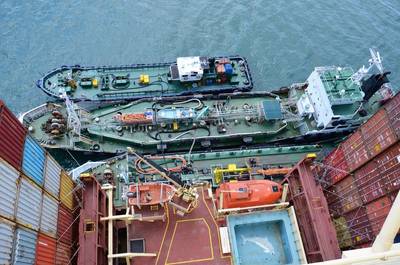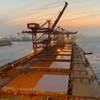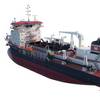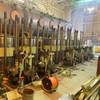Updated Framework Released for Comparing Decarbonization Technologies
The Maritime Technologies Forum (MTF) has released an updated Framework for Assessing Decarbonization Technologies and Alternative Energy Carriers and a comprehensive assessment on the maturity and readiness of alternative fuel options, expanding the number of evaluated fuels covered since the previous heatmap report issued in November 2022.
The assessment applied MTF’s recently updated framework to an expanded set of eight fuels, including fossil LNG, fossil MGO combined with carbon capture and storage (CCS), liquefied bio-methane, bio-methanol, green synthetic methanol, green ammonia and liquefied blue hydrogen, comparing each to the current baseline fuel, fossil MGO.
“We are pleased to deliver this updated framework and heatmap report which builds on our previous work by expanding the number of evaluated fuels and explores the critical boundary conditions for each. Understanding the level of readiness, including availability and scalability, of a variety of alternative fuel options is an important step to helping industry prioritize and safely deliver the next generation of fuels and enabling technologies,” said Christopher J. Wiernicki, ABS Chairman and CEO.
“By evaluating a wide variety of emerging fuels through MTF’s newly revised framework, we were able to get a more comprehensive view and gain a better comparison of how all of the fuels stack up against each other. This evaluation provides a critical roadmap for industry’s adoption of alternative fuels, supporting a safer and more sustainable maritime industry,” said Knut Ørbeck-Nilssen, DNV Maritime CEO.
The MTF framework, led by DNV, covers eight categories of evaluation, greenhouse gas emission intensity, technology readiness and acceptance, sustainability and environmental aspects, safety, economic viability, regulatory maturity, skills availability and engineering. The framework criteria work as a checklist, ensuring a systematic and standardized evaluation of technologies and energy carriers.
In addition to assessing the feasibility of each fuel based on the relevant criteria, the evaluation also takes into consideration the level of confidence in the assessment. Results of the assessment are presented in the form of heatmaps, aiding the identification of hot spots that are areas requiring more attention or prioritisation to help industry meet ambitious net-zero emission goals.
Work on the heatmap report, led by ABS, concluded with five key observations:
• Well-to-wake GHG emission performance is critical in the long term: The use of biofuels and hydrogen-based solutions will provide lower lifecycle emissions (potentially zero or near zero when using sustainable energy sources).
• Safety needs careful management for some hydrogen-based synthetic fuels: There is a moderate amount of data available for using ammonia and hydrogen as fuel. Most of this data is from other industries, or the carriage of fuel on liquified gas carriers. Additional research and studies are needed to further reduce or fully mitigate the associated risks addressing bunkering and onboard handling for these alternative solutions as fuels.
• The need for additional training related to handling of more hazardous alternative fuels is reconfirmed: Training, safety awareness and management practices need to develop to similar levels seen onshore for these hazardous fuels.
• Technology for many fuel options is available with high maturity: In terms of technology readiness, all solutions considered as demonstrated, or proven, in a relevant environment (TRL 6 or above). Use of ammonia and CCS still needs to be proven to reach a sufficient TRL for commercial uptake. Retrofits are generally possible with varying engineering complexity.
• Supply chain resilience is not known for biofuels and hydrogen-based synthetic fuels: Supply chain resilience has been evaluated as low on confidence for all the biofuels and hydrogen-based fuels considered, and currently as not feasible for green ammonia. This accounts for the current limited fuel availability.











